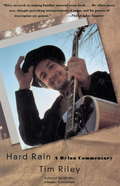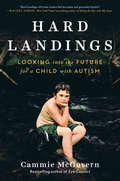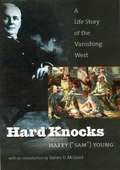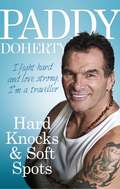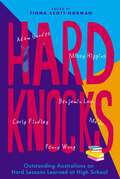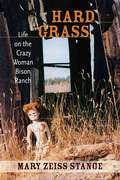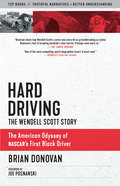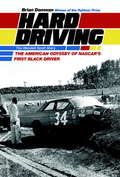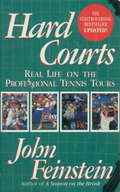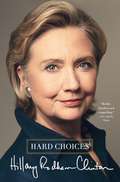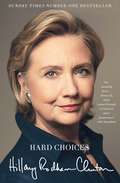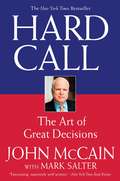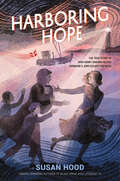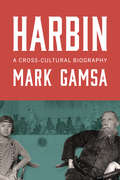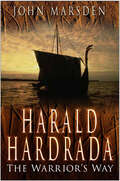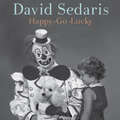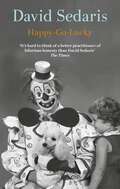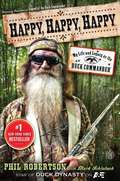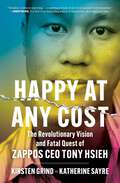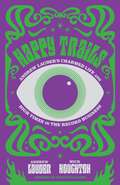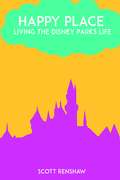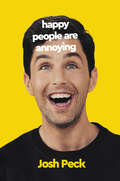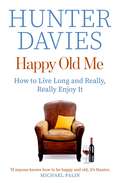- Table View
- List View
Hard Rain: A Dylan Commentary
by Tim RileyRanging over 30 years of Bob Dylan recordings, films, and concerts, this updated edition includes a new epilogue that examines his 30th anniversary celebration and his 1998 Grammy Award comeback.
Hard Landings: Looking Into the Future for a Child With Autism
by Cammie McGovernA game-changing exploration of what the future holds for the first generation of mainstreamed neurodiverse kids that is coming of age.After sleepless nights, intensive research, and twenty-one years of raising a child, Ethan, with autism and intellectual disability, Cammie McGovern is approaching a distinct catch-22. Once Ethan turns twenty-two, he will fall off the "Disability Cliff." By aging out of the school system, he'll lose access to most social, educational, and vocational resources. The catch is this: These resources, limited as they may be, have trained Ethan in skills for jobs that don't exist and a life he can't have.Here, McGovern expands on her #1 New York Times piece, "Looking into the Future for a Child with Autism," a future that often appears grim, with statistics like an 85 percent unemployment rate for people with ID. McGovern spent a year traveling the country and looking at the options for work and housing--and to her surprise discovered reasons to be optimistic. She asks the tough questions: What should parents prioritize as they ready their children for adulthood? How do we redefine success for our children? How can we sustain a hopeful attitude while navigating one obstacle after another?As Ethan makes his way into the world, McGovern also looks into the hardest question of all: How can we ensure an independent future when we're gone? Hard Landings will serve as a renewed beacon of hope for parents who want to ensure the fullest life possible for their child's future.
Hard Knocks: A Life Story of the Vanishing West
by Harry YoungLong out of print, Young's story of his adventures in the early West is available again with a new introduction by Calamity Jane biographer James D. McLaird. Read Young's eyewitness accounts of Calamity Jane on the Jenney Expedition and the shooting of Wild Bill Hickok.
Hard Knocks & Soft Spots
by Paddy Doherty'I fight hard and love strong. I'm a traveller.'Paddy Doherty loves his life as an Irish traveller, but as a child he felt like an outsider. He was different to his siblings. On the rare occasions he went to school, he was bullied for being a gypsy boy. And beyond the gates of the camp he found nothing but hostility. Slowly, Paddy's hurt turned into anger and by the age of 11 he had started out on an illustrious career in bare-knuckle fighting. This earned him a position as one of the most well-respected (and feared) men in the travelling community. Yet while he won countless contests in the ring, the real battles he faced were very much outside.In this deeply honest autobiography, he tells of how he has loved and lost five children; plummeted to seven stone while battling depression, drink and drugs. He describes how it feels to be shot point-blank in the head and the lengths he'll go to to protect his people, as well as life since My Big Fat Gypsy Wedding and Big Brother.Told with all the warmth and humour he is famed for, Paddy's rich and colourful story is one that will stay with you for a long time to come.
Hard Knocks
by Fiona Scott-NormanOne of the hardest things about being different at high school is the feeling that nobody understands what you're going through.In Hard Knocks, twenty-two of Australia's most talented and successful people convey exactly what it's like to be isolated or bullied, unhappy or misunderstood, and show how staying true to yourself is what makes you exceptional in the long run.In candid and entertaining interviews, leading lights from across Australian life recount the obstacles they faced such as racism, homophobia and mental health challenges. Not only did they survive the ordeal but their experiences helped shape them into the remarkable individuals they are today.Contributors include:Missy Higgins, Adam Goodes, Stella Young, Mo'Ju, Judith Lucy, Benjamin Law, Kate Miller-Heidke, Hazem El Masri, Karen from Finance, Christos Tsiolkas, Carly Findlay, Charlie Pickering, Alice Pung, Holden Sheppard, Megan Washington, Annie Louey, Corey Tutt, Paul Capsis, Penny Wong, Brendan Cowell, Tiffiny Hall, Eddie Perfect
Hard Grass: Life on the Crazy Woman Bison Ranch
by Mary Zeiss StangeMary Zeiss Stange's story of running a bison ranch with her husband in southeastern Montana--on the outskirts of nowhere and far-from-here--is a narrative of survival in a landscape and a society at once harsh and alluring. In this series of essays she illustrates the realities of ranch life at a time when the New West of subdivision, ranchettes, telecommuting, and tourism collides with the True West of too much, too little, too hard, and too harsh. This society is molded by the climate, and both run to extremes, simultaneously unforgiving, often brutal, yet capable of unalloyed charm and breathtaking beauty.Her stories explore the myths and realities of ranch life in modern America--the brandings, rodeos, and demolition derbies that are major events, and the social, environmental, and political factors at work in shaping the land and the people.Less memoir than deep history of people and place, these vivid, naturalistic tales examine the complex relationships that comprise life in the rural West today.
Hard Driving: The Wendell Scott Story (Documentary Narratives)
by Brian DonovanThe only book-length account of the life of Wendell Scott, the one-time moonshine runner who broke the color barrier in stock-car racing in 1952 and, against all odds, competed for more than 20 years in a sport dominated by Southern whites.Hard Driving is the story of one man's determination to live the life he loved, and to compete at the highest level of his sport. When Wendell Scott became NASCAR's version of Jackie Robinson in the segregated 1950s, some speedways refused to let him race. Scott appealed directly to the sport's founder, NASCAR czar Bill France Sr., who promised that NASCAR would treat him without prejudice. For the next two decades, Scott chased a dream whose fulfillment depended on France backing up that promise. France reneged on his pledge, but Scott did receive inspiring support from white drivers who admired his skill and tenacity, such as NASCAR champions Ned Jarrett and Richard Petty.
Hard Driving: The Wendell Scott Story
by Brian DonovanHard Driving is the dramatic story of one man's dogged determination to live the life he loved, and to compete, despite daunting obstacles, at the highest level of his sport. Wendell Scott figured he was signing up for trouble when he became NASCAR's version of Jackie Robinson in the segregated 1950s. Some speedways refused to let him race. "Go home, nigger," spectators yelled. And after a bigoted promoter refused to pay him, Scott appealed directly to the sport's founder, NASCAR czar Bill France Sr. France made a promise Scott would never forget - that NASCAR would never treat him with prejudice. For the next two decades, Scott chased a dream whose fulfillment depended on France backing up that promise. Persevering through crashes, health problems, and money troubles, Scott remained convinced he had the talent to become one of NASCAR's best. Hard Driving documents a previously untold chapter in the history of integration, politics, and sports in America. It reveals how France, founder of the multibillion-dollar NASCAR empire, reneged on his pledge and allowed repeated discrimination against Scott by racing officials and other powerful figures. It details France's alliances with leading segregationist politicians such as George Wallace, the reluctance of auto executives such as Lee Iacocca to sponsor a black driver; and the inspiring support Scott received from white drivers such as NASCAR champions Ned Jarrett and Richard Petty, who admired his skill and tenacity.
Hard Courts: Real Life on the Professional Tennis Tours
by John FeinsteinThe new edition of this bestseller in hardcover features never-before-published, all-new inside info on the money, personalities and politics of pro-tennis: Jimmy, Monica, Boris, Martina, et al.
Hard Choices: A Memoir
by Hillary Rodham ClintonHillary Rodham Clinton’s inside account of the crises, choices, and challenges she faced during her four years as America’s 67th Secretary of State, and how those experiences drive her view of the future.“All of us face hard choices in our lives,” Hillary Rodham Clinton writes at the start of this personal chronicle of years at the center of world events. “Life is about making such choices. Our choices and how we handle them shape the people we become.”In the aftermath of her 2008 presidential run, she expected to return to representing New York in the United States Senate. To her surprise, her former rival for the Democratic Party nomination, newly elected President Barack Obama, asked her to serve in his administration as Secretary of State. This memoir is the story of the four extraordinary and historic years that followed, and the hard choices that she and her colleagues confronted.Secretary Clinton and President Obama had to decide how to repair fractured alliances, wind down two wars, and address a global financial crisis. They faced a rising competitor in China, growing threats from Iran and North Korea, and revolutions across the Middle East. Along the way, they grappled with some of the toughest dilemmas of US foreign policy, especially the decision to send Americans into harm’s way, from Afghanistan to Libya to the hunt for Osama bin Laden.By the end of her tenure, Secretary Clinton had visited 112 countries, traveled nearly one million miles, and gained a truly global perspective on many of the major trends reshaping the landscape of the twenty-first century, from economic inequality to climate change to revolutions in energy, communications, and health. Drawing on conversations with numerous leaders and experts, Secretary Clinton offers her views on what it will take for the United States to compete and thrive in an interdependent world. She makes a passionate case for human rights and the full participation in society of women, youth, and LGBT people. An astute eyewitness to decades of social change, she distinguishes the trendlines from the headlines and describes the progress occurring throughout the world, day after day.Secretary Clinton’s descriptions of diplomatic conversations at the highest levels offer readers a master class in international relations, as does her analysis of how we can best use “smart power” to deliver security and prosperity in a rapidly changing world—one in which America remains the indispensable nation.
Hard Choices
by Hillary Rodham ClintonHillary Rodham Clinton's inside account of the crises, choices, and challenges she faced during her four years as America's 67th Secretary of State, and how those experiences drive her view of the future."All of us face hard choices in our lives," Hillary Rodham Clinton writes at the start of this personal chronicle of years at the center of world events. "Life is about making such choices. Our choices and how we handle them shape the people we become." In the aftermath of her 2008 presidential run, she expected to return to representing New York in the United States Senate. To her surprise, her former rival for the Democratic Party nomination, newly elected President Barack Obama, asked her to serve in his administration as Secretary of State. This memoir is the story of the four extraordinary and historic years that followed, and the hard choices that she and her colleagues confronted. Secretary Clinton and President Obama had to decide how to repair fractured alliances, wind down two wars, and address a global financial crisis. They faced a rising competitor in China, growing threats from Iran and North Korea, and revolutions across the Middle East. Along the way, they grappled with some of the toughest dilemmas of US foreign policy, especially the decision to send Americans into harm's way, from Afghanistan to Libya to the hunt for Osama bin Laden. By the end of her tenure, Secretary Clinton had visited 112 countries, traveled nearly one million miles, and gained a truly global perspective on many of the major trends reshaping the landscape of the twenty-first century, from economic inequality to climate change to revolutions in energy, communications, and health. Drawing on conversations with numerous leaders and experts, Secretary Clinton offers her views on what it will take for the United States to compete and thrive in an interdependent world. She makes a passionate case for human rights and the full participation in society of women, youth, and LGBT people. An astute eyewitness to decades of social change, she distinguishes the trendlines from the headlines and describes the progress occurring throughout the world, day after day. Secretary Clinton's descriptions of diplomatic conversations at the highest levels offer readers a master class in international relations, as does her analysis of how we can best use "smart power" to deliver security and prosperity in a rapidly changing world--one in which America remains the indispensable nation.
Hard Choices
by Hillary Rodham ClintonHILLARY RODHAM CLINTON'S INSIDE ACCOUNT OF THE CRISES, CHOICES AND CHALLENGES SHE FACED DURING HER FOUR YEARS AS AMERICA'S 67TH SECRETARY OF STATE, AND HOW THOSE EXPERIENCES DRIVE HER VIEW OF THE FUTURE.'All of us face hard choices in our lives,' Hillary Rodham Clinton writes at the start of this personal chronicle of years at the centre of world events. 'Life is about making such choices. Our choices and how we handle them shape the people we become.' In the aftermath of her 2008 presidential run, she expected to return to representing New York in the Unites States Senate. To her surprise, her formal rival for the Democratic Party nomination, newly elected President Barack Obama, asked her to serve in his administration as Secretary of State. This memoir is the story of the four extraordinary and historic years that followed, and the hard choices that she and her colleagues confronted. Secretary Clinton and President Obama had to decide how to repair fractured alliances, wind down two wars and address a global financial crisis. They faced a rising competitor in China, growing threats from Iran and North Korea, and revolutions across the Middle East. Along the way, they grappled with some of the toughest dilemmas of US foreign policy, especially the decision to send Americans into harm's way, from Afghanistan to Libya to the hunt for Osama bin Laden. By the end of her tenure, Secretary Clinton had visited 112 countries, travelled nearly one million miles and gained a truly global perspective on many of the major trends reshaping the landscape of the twenty-first century, from economic inequality to climate change to revolutions in energy, communications and health. Drawing on conversations with numerous leaders and experts, Secretary Clinton offers her views on what it will take for the United States to compete and thrive in an interdependent world. She makes a passionate case for human rights and the full participation in society of girls, youth and LGBT people. An astute eyewitness to decades of social change, she distinguishes the trendlines from the headlines and describes the progress occurring throughout the world, day after day. Secretary Clinton's descriptions of diplomatic conversations at the highest levels offer readers a masterclass in international relations, as does her analysis of how we can best use 'smart power' to deliver security and prosperity in a rapidly changing world - one in which America remains the indispensable nation.
Hard Call: Great Decisions and the Extraordinary People Who Made Them
by John Mccain Mark SalterAt some point in our lives, we all face tough decisions and have to make that hard call. In this remarkable book, Senator McCain and Mark Salter use experiences of both extraordinary people and people in extraordinary circumstances to dramatically describe the anatomy of a great decision. Highlights include: - Henry Ford's decision to sacrifice his company's competitive edge by reducing the work day and guaranteeing a minimum wage. - Branch Rickey's decision to offer Jackie Robinson a contract to play for the Brooklyn Dodgers in the face of public opposition. - Ellen Johnson-Sirleaf 's decision to return to wartorn Liberia after receiving an economics degree from Harvard. - General Fred Weyand's decision to redeploy fifteen of his battalions despite resistance from senior American military commanders in Vietnam. - And much more.
Harboring Hope: The True Story of How Henny Sinding Helped Denmark's Jews Escape the Nazis
by Susan HoodThe inspirational true story of how twenty-two-year-old Henny Sinding courageously helped smuggle hundreds of Jewish families in occupied Denmark to safety in Sweden during the Holocaust. A middle grade nonfiction novel-in-verse by award-winning author Susan Hood.It wouldn’t be easy, but they had to try.It was their only chance to survive. In 1943, Henny Sinding, only twenty-two years old, and the crew of Gerda lll, a lighthouse supply boat, risked everything to smuggle their Jewish compatriots across the Øresund strait to safety in Sweden during World War ll. In Henny’s words, “It was the right thing to do so we did it. Simple as that.” But what happened when their operation’s cover was blown and it was Henny’s turn to escape?This incredible true story in-verse about courage, community, humanity, and hope is perfect for fans of Lifeboat 12, Alias Anna, and Alan Gratz.Includes extensive back matter with primary sources, additional information, further reading, and photographs. A JUNIOR LIBRARY GUILD GOLD STANDARD SELECTION!
Harbin: A Cross-Cultural Biography
by Mark GamsaThis book offers an intimate portrait of early-twentieth-century Harbin, a city in Manchuria where Russian colonialists, and later refugees from the Revolution, met with Chinese migrants. The deep social and intellectual fissures between the Russian and Chinese worlds were matched by a multitude of small efforts to cross the divide as the city underwent a wide range of social and political changes. Using surviving letters, archival photographs, and rare publications, this book also tells the personal story of a forgotten city resident, Baron Roger Budberg, a physician who, being neither Russian nor Chinese, nevertheless stood at the very centre of the cross-cultural divide in Harbin. The biography of an important city, fleshing out its place in the global history of East-West contacts and twentieth-century diasporas, this book is also the history of an individual life and an original experiment in historical writing.
Harald Hardrada: The Warrior's Way
by John MarsdenOne of the greatest medieval warriors Harald Sigurdsson, nicknamed Hardrada (Harold the Ruthless or hard ruler) fell in battle in an attempt to snatch the crown of England. The spectacular and heroic career which ended at Stamford Bridge in Yorkshire on 25 September 1066 had taken Harald from Norway to Russia and Constantinople and saw him gain a kingdom by force and determination rather than right or inheritance. He was one of the most feared rulers in Europe and was first and foremost a professional soldier, who acquired great wealth by plunder and showed no mercy to those he conquered. 'Harald Hardrada: The Warrior's Way' reconstructs a military career spanning three and a half decades and involving encounters with an extraordinary range of allies and enemies in sea-fights and land battles, sieges and viking raids across a varity of theatres of war. John Marsden's superbly researched and powerfully written account takes us from the lands of the Norsemen to Byzantium and the Crusades and makes clear how England moved decisively from three hundred years of exposure to the Scandinavian orbit to a stronger identification with continental Europe following the Norman invasion.
Happy-Go-Lucky (Language Acts and Worldmaking #22)
by David SedarisBack when restaurant menus were still printed on paper, and wearing a mask-or not-was a decision made mostly on Halloween, David Sedaris spent his time doing normal things. As Happy-Go-Lucky opens, he is learning to shoot guns with his sister, visiting muddy flea markets in Serbia, buying gummy worms to feed to ants, and telling his nonagenarian father wheelchair jokes. But then the pandemic hits, and like so many others, he's stuck in lockdown, unable to tour and read for audiences, the part of his work he loves most. To cope, he walks for miles through a nearly deserted city, smelling only his own breath. He vacuums his apartment twice a day, fails to hoard anything, and contemplates how sex workers and acupuncturists might be getting by during quarantine. As the world gradually settles into a new reality, Sedaris too finds himself changed. His offer to fix a stranger's teeth rebuffed, he straightens his own, and ventures into the world with new confidence. Newly orphaned, he considers what it means, in his seventh decade, no longer to be someone's son. And back on the road, he discovers a battle-scarred America: people weary, storefronts empty or festooned with Help Wanted signs, walls painted with graffiti reflecting the contradictory messages of our time: Eat the Rich. Trump 2024. Black Lives Matter. In Happy-Go-Lucky, David Sedaris once again captures what is most unexpected, hilarious, and poignant about these recent upheavals, personal and public, and expresses in precise language both the misanthropy and desire for connection that drive us all. If we must live in interesting times, there is no one better to chronicle them than the incomparable David Sedaris.Praise for Calypso'Sedaris is the premier observer of our world and its weirdnesses' Adam Kay, author of This is Going to Hurt'He's like an American Alan Bennett' Guardian'Unquestionably the king of comic writing . . . Calypso is both funnier and more heartbreaking than pretty much anything out there' Hadley Freeman, Guardian
Happy-Go-Lucky
by David SedarisBack when restaurant menus were still printed on paper, and wearing a mask-or not-was a decision made mostly on Halloween, David Sedaris spent his time doing normal things. As Happy-Go-Lucky opens, he is learning to shoot guns with his sister, visiting muddy flea markets in Serbia, buying gummy worms to feed to ants, and telling his nonagenarian father wheelchair jokes. But then the pandemic hits, and like so many others, he's stuck in lockdown, unable to tour and read for audiences, the part of his work he loves most. To cope, he walks for miles through a nearly deserted city, smelling only his own breath. He vacuums his apartment twice a day, fails to hoard anything, and contemplates how sex workers and acupuncturists might be getting by during quarantine. As the world gradually settles into a new reality, Sedaris too finds himself changed. His offer to fix a stranger's teeth rebuffed, he straightens his own, and ventures into the world with new confidence. Newly orphaned, he considers what it means, in his seventh decade, no longer to be someone's son. And back on the road, he discovers a battle-scarred America: people weary, storefronts empty or festooned with Help Wanted signs, walls painted with graffiti reflecting the contradictory messages of our time: Eat the Rich. Trump 2024. Black Lives Matter. In Happy-Go-Lucky, David Sedaris once again captures what is most unexpected, hilarious, and poignant about these recent upheavals, personal and public, and expresses in precise language both the misanthropy and desire for connection that drive us all. If we must live in interesting times, there is no one better to chronicle them than the incomparable David Sedaris.Praise for Calypso'Sedaris is the premier observer of our world and its weirdnesses' Adam Kay, author of This is Going to Hurt'He's like an American Alan Bennett' Guardian'Unquestionably the king of comic writing . . . Calypso is both funnier and more heartbreaking than pretty much anything out there' Hadley Freeman, Guardian
Happy, Happy, Happy: My Life and Legacy as the Duck Commander
by Phil RobertsonThis no-holds-barred autobiography chronicles the remarkable life of Phil Robertson, the original Duck Commander and Duck Dynasty® star, from early childhood through the founding of a family business.LIVING THE DREAMDuck calls—though the source of his livelihood—are not what makes Phil Robertson the man he is today. When asked what matters in his life, he’s quick to say, “Faith, family, ducks—in that order.” It isn’t often that a person can live a dream, but Phil Robertson, aka The Duck Commander, has proven that it is possible with vision, hard work, helping hands, and an unshakable faith in the Almighty. Phil’s is the remarkable story of one man who followed the call he received from God and soon after invented a duck call that would begin an incredible journey to the life he had always dreamed of for himself and his family. In the love of his country, his family, and his maker, Phil has finally found the ingredients to the “good life” he always wanted. If you ever wind up sitting face-to-face with Phil, you’ll see that his enthusiasm and passion for duck hunting and the Lord is no act—it is truly who he is.If you’ve watched the exceedingly popular A&E® program Duck Dynasty®, you already know the famed Phil Robertson. As patriarch of the Robertson clan and creator of Duck Commander duck calls, he fearlessly leads his family in a responsible work ethic and an active faith.But what you don’t know is his life before the show. In the pages of this book, you’ll learn of Phil’s colorful past and his wild road to the “happy, happy, happy” life he leads today. Before the “happy,” Phil’s passion for the outdoors and wild living led him down some shady paths. As a young husband and father, he became the proprietor of a rough bar and lived a life, as he says, of “romping, stomping, and ripping” for a number of years. He even left his wife and young boys for a short period of time.Through it all, Phil Robertson has lived his life as a “called” man. Called to live off the land, called to leave a starring role in Louisiana Tech football (playing ahead of Terry Bradshaw) for duck hunting, called to wild living, called to create a new kind of duck call—and finally, called to follow God and lead a life of faith. In this eye-opening and rousing book, you’ll find stories that will shock you, as well as those that will inspire you. You’ll get to know the man behind the legend, and you’ll come away better for it.
Happy at Any Cost: The Revolutionary Vision and Fatal Quest of Zappos CEO Tony Hsieh
by Kirsten Grind Katherine SayreFrom award-winning Wall Street Journal reporters, &“a startling portrait of one of our greatest tech visionaries, Zappos CEO Tony Hsieh&” (Robert Kolker, author of Hidden Valley Road), reporting on his short life and untimely death and what they mean for our culture&’s pursuit of happiness.Tony Hsieh—CEO of Zappos, Las Vegas developer, and all-around beloved entrepreneur—was famous for spreading happiness. He lived and breathed this philosophy, instilling an ethos of joy at his company and outlining his vision for a better workplace in his New York Times bestseller Delivering Happiness. He promoted a workplace where bosses treated employees like family members, where stress was replaced by playfulness, and where hierarchies were replaced with equality and collaboration. His outlook shaped Silicon Valley and the larger business world. Hsieh used his position at work to integrate levity into a normally competitive environment. He aspired to build his own utopian cities, pouring millions of dollars into real estate and small businesses, first in downtown Las Vegas, Nevada—where Zappos was headquartered—and then in Park City, Utah. He gave generously to his employees and close friends, including throwing infamous Zappos parties and organizing gatherings at his home, an Airstream trailer park. When Hsieh died suddenly in November of 2020, the news shook the business and tech world. Wall Street Journal reporters Kirsten Grind and Katherine Sayre quickly realized the importance of the story because of Hsieh&’s stature in the industry, but as they dug into the details of his final months, they realized there was a bigger story to tell. They found that Hsieh&’s obsession with happiness masked his darker struggles with addiction, mental health, and loneliness. In the last year of his life, he spiraled out of control, cycling out of rehab and into the waiting arms of friends who enabled his worst behavior, even as he bankrolled them from his billion-dollar fortune. Happy at Any Cost sheds light on one of the most venerated, yet vulnerable, business leaders of our time. It's about our culture&’s intense need to find &“happiness&” at all costs, our misguided worship of entrepreneurs, the stigmas still surrounding mental health, and how the trappings of fame can mask all types of deeper problems. In turn, it reveals how we conceptualize success—and define happiness—in our modern age.
Happy Trails: Andrew Lauder's Charmed Life and High Times in the Record Business
by Mick Houghton Andrew LauderAndrew Lauder is one of British record business's most significant and highly influential figures but outside the music industry few people will probably know his name. He's always retained a fan's perspective which, combined with an exceptional knowledge of music, meant he was at ease around musicians and never happier than spending time with them. During the later '60s and throughout the '70s in particular (working at the legendary United Artists), he had a knack of being one step ahead of the next trend. In hindsight it's easy to identify the changing eras in music but underground music, pub rock and punk in Britain, for example, evolved quite seamlessly and it was visionaries like Andrew who, instinctively, saw what was coming and helped bring about those transitions. He was ahead of the game in other ways too; pioneering a more creative way of marketing and promoting records and revolutionising the way catalogue was organised and presented. This is his story.
Happy Together: Bridging the Australia-China Divide
by David Walker Li YaoIn the late nineteenth century, as crippling famine devastated northern China, the Li family had no choice but to leave Shanxi province. Heading north, they began a new life, farming the remote grasslands of Inner Mongolia. They prospered as landowners and teachers, but could not escape the ravages of warlords, soldiers and revolutionaries. Born into this pioneering family, Li Yao grew up in Mao's China. He dreamt of becoming a writer, but his dreams were torn apart by the Cultural Revolution. When the storm finally subsided, the young man turned to translation. In Australian writing, he found colourful tales set in new landscapes, a literature quite unfamiliar to him. Li Yao's story is interwoven with that of his friend, Australian historian David Walker. David's family had also settled in an unfamiliar and difficult land, a world away in distant South Australia. The two men became friends as Li Yao translated one of David's books into Chinese, and their personal histories provide a fascinating, illuminating window into life in China, an experience inevitably shaped by China's relations with the wider world.
Happy Place: Living the Disney Parks Life
by Scott RenshawWhat if the childhood day you remembered as one of the most magical of your life became every day of your life?In Happy Place, Scott Renshaw explores the phenomenon of Disney theme park super-fans, and the unique connections they build with places known to most people only as occasional vacation destinations. Along the way, Renshaw meets a pass-holder who has visited Disneyland for one thousand consecutive days, another who has taken more than three thousand rides on his single favorite attraction, and even to some who have managed to turn visiting Disney parks into their job. Happy Place is also a personal journey to find out what happens when an infatuation with the parks turns into a relationship. Is that relationship always full of joy, or-when nostalgia collides with the realities of a corporation running a business-can it sometimes turn to frustration and disappointment?Happy Place isn't the story of a place. It's a love story, about the kind of love that emerges when "happiest place on earth" becomes more than just a slogan.Scott Renshaw has been Arts & Entertainment Editor and film critic for the Salt Lake City Weekly newspaper since 2002, with film reviews appearing in alternative newsweeklies in ten states. Over a twenty-year career as a professional writer and critic, he has received awards from the Society of Professional Journalists and the Association of Alternative Newsmedia, and has contributed writing about Disney parks to the website IndieWire. This is his first book.
Happy People Are Annoying
by Josh PeckA wonderfully candid memoir from one of the most recognizable faces of a generation, actor, writer, Youtuber, and television superstar, Josh Peck. In his warm and inspiring book, Josh reflects on the many stumbles and silver linings of his life and traces a zigzagging path to redemption. Written with such impressive detail and aching honesty, Happy People are Annoying is full of surprising life lessons for anyone seeking to accept their past and make peace with the complicated face in the mirror.Josh Peck rose to near-instant fame when he starred for four seasons as the comedic center of Nickelodeon’s hit show Drake & Josh. However, while he tried to maintain his role as the funniest, happiest kid in every room, Josh struggled alone with the kind of rising anger and plummeting confidence that quietly took over his life.For the first time, Josh reflects on his late teens and early twenties. Raised by a single mother, and coming of age under a spotlight that could be both invigorating and cruel, Josh filled the cratering hole in his self-worth with copious amounts of food, television, drugs, and all of the other trappings of young stardom. Until he realized the only person standing in his way...was himself. Today, with a string of lead roles on hit television shows and movies, and one of the most enviable and dedicated fanbases on the internet, Josh Peck is more than happy, he’s finally, enthusiastically content.Happy People are Annoying is the culmination of years of learning, growing, and finding bright spots in the scary parts of life. Written with the kind of humor, strength of character, and unwavering self-awareness only someone who has mastered their ego can muster, this memoir reminds us of the life-changing freedom on the other side of acceptance.
Happy Old Me: How to Live A Long Life, and Really Enjoy It
by Hunter Davies'As long as I&’m alive, I&’ll be with her, and she&’ll be with me.' Hunter Davies on Margaret Forster.Happy Old Me is a moving yet uplifting account of one year in Hunter Davies&’ life, navigating bereavement and finding hope in the future. On 8th February 2016, Margaret Forster lost her life to cancer of the spine. The days that followed for her husband, Hunter Davies, were carried out on autopilot: arrangements to be made, family and friends to be contacted. But how do you cope after you have lost your loved one? How do you carry on? As Hunter navigates what it means to be alone again after 55 years of marriage, coping with bereavement and being elderly (he still doesn&’t believe he is), he shares his wisdom and lessons he has learnt living alone again. Revealing his emotional journey over the course of one year, as well as the often ignored practical implications of becoming widowed, he learns that, ultimately, bricks and mortar may change but the memories will remain. Part memoir, part self-help, Happy Old Me is a fitting, heart-felt tribute to the love of his life and a surprisingly amusing and informative book about an age, and stage in life, which we might all reach someday. The third book in Hunter Davies' much-loved memoir series, which includes The Co-Op's Got Bananas and A Life in the Day. Praise for Hunter Davies:- &‘He recalls his childhood growing up in Scotland and Cumbria in the Forties and Fifties, capturing gritty working-class life with humour and charm and painting a vivid picture of that period of social history&’ Press Association &‘What sets this book apart, though, is its avoidance of cliché and its determination to reveal everything that might be revealed.&’ Daily Mail &‘Eighty-year-old Davies takes a delightfully irreverent approach to his account of his youth and his days as a rookie journalist. Food was rationed, clothes were utilitarian and life could be rough, but there was fun to be had from friendships, films, skiffle and girls&’ Sunday Express &‘Davies is a wonderful companion, leading readers down memory lane with great chumminess that will really resonate with those of a certain age. This book deserves a place on the shelf beside Alan Johnson&’s This Boy.&’ Express 'Ken Loach might have turned all this into a powerful social film, but the avuncular Davies sprinkles in so many cheery anecdotes that the book bounces along enjoyably' Sunday Times
